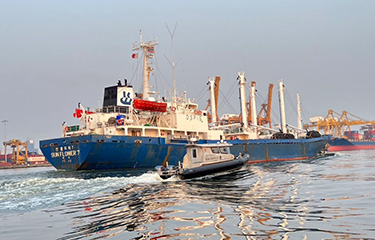Authorities in Thailand and South Korea have taken action against a Korean fishing vessel suspected of engaging in illegal, unreported, and unregulated (IUU) fishing.
On 9 March, police in Bangkok, Thailand prevented South Korea-flagged Sun Flower 7 from unloading more than 4,000 metric tons (MT) of tuna worth an estimated THB 250 million (USD 7.4 million, EUR 6.8 million).
On 10 May, South Korea’s Ministry of Fisheries subsequently fined the Sun Flower 7 KRW 200 million (USD 150,000, EUR 138,000) for “very serious” violations of the country’s distant-water fishing law, according to the Environmental Justice Foundation (EJF). The Thai and South Korean governments accused the vessel of retrieving fish-aggregating devices (FADs) in the exclusive economic zone of Kiribati, where it did not have permission to fish.
The Environmental Justice Foundation, which has worked with the Thai government since 2014 to improve its fisheries management system, accused South Korea’s distant-water fleet of “a systemic lack of compliance with FAD regulations across the Western and Central Pacific Ocean.” In a recent report, EJF suggested the Sun Flower 7 was one of at least 10 South Korean vessels that have conducted illegal fishing in Kiribati and the high seas under the management of the Western and Central Pacific Fisheries Commission.
In collaboration with Starboard Marine Intelligence, EJF investigated tracking data for numerous vessels with connections to South Korean fishing companies over a two-year period, uncovering likely illegal deployment and collection of FADs, including during seasonal closures. In light of the report, EJF called on the South Korean government to “take strong action to review all vessel monitoring information and communications records for the fish carriers in question, and take appropriate action in accordance with the applicable laws.”
“Without this, those responsible will continue to benefit from the destruction of ocean ecosystems and the flouting of international fisheries management rules,” EJF said.
South Korea, the fifth-largest importer of seafood in the world behind the E.U., U.S., Japan, and China, has faced criticism for years about its lack of effort in combating IUU fishing. In April 2023, EJF reported on a lack of tracking and transparency of product types, port of landing, fishing gear, and processing locations for the seafood it imports. In 2021, a separate EJF investigation exposed alleged mistreatment of migrant workers on some of South Korea's distant-water fishing vessels. And in 2019, the U.S. government lodged a complaint against South Korea under the regulations of their free-trade agreement after a report by the U.S. National Marine Fisheries Service revealed South Korea had not effectively prevented its vessels from engaging in IUU fishing.
EJF CEO and Founder Steve Trent commended Thailand for its efforts to prohibit the Sun Flower 7 from offloading its catch and urged other port states to follow suit in taking action against scofflaws. Trent also called for the international acceptance of the Global Charter for Fisheries Transparency, which offers governments practical and cost-effective suggestions to mitigate the risks of illegal fishing, human rights abuses, and the collapse of ocean ecosystems.
“We all benefit from legal, sustainable, ethical fisheries, and every port and flag state can help to bring them about,” Trent said in a press release. “For a safe, sustainable planet, enshrining the principles of the Global Charter for Transparency into law should be a priority for South Korea and every nation across the globe.”
Thailand has itself been criticized in the past for its own transgressions on IUU fishing issues. In 2016, it faced the possibility of receiving a red card from the European Union, which would have prevented it from exporting seafood to the E.U. In a March 2023 statement, Thailand Deputy Prime Minister and National Fisheries Policy Committee Chair General Prawit Wongsuwan, said the Thai government had been motivated to take action in part “to maintain its green flag status from the European Union” in its traffic-light rating system.
“We must act quickly to prohibit aquatic animals obtained from illegal fishing into the country. in order not to support wrongdoing and must issue an order for such ship to leave the kingdom immediately,” he said. “By having all relevant agencies integrate together to inspect the said fishing vessel. including ensuring that There will be no smuggling of such aquatic animals at any other port in Thailand again. Therefore, we would like to warn the various aquatic animal processing industries: please verify the origin of the aquatic animals that will be used in the produce to ensure that they are not related to illegal fishing. It is a responsibility to the country as the overseas [seafood] industry is concerned with such matters, in order to clearly show the intent Thailand does not support illegal fishing at all.”
Photo courtesy of Environmental Justice Foundation







